
A medical professional setting up an IV bottle in a Sulaimani tent hosting protesting teachers on a hunger strike on February 2, 2025. Photo: Didar Abdalrahman/Rudaw
SULAIMANI, Kurdistan Region - With empty pockets and through cold weather, teachers in Sulaimani have set up camp on a hunger strike for several days protesting over a decade of late and unpaid salaries, saying that they are resolute in obtaining their rights despite little support from Erbil and Baghdad.
Teachers in Sulaimani have camped in front of a United Nations office on a hunger strike, demanding a resolution to the Kurdistan Regional Government’s (KRG) decade-long inconsistent salary payments, with many months over the years remaining unpaid. With bloodshot eyes and weakened bodies, some receive IV therapy, while medical professionals and family members tend to them.
“We, as teachers, as a people stripped of their rights, as intellectuals we want to raise awareness in our society,” Awat Azad, a protesting teacher lying first in the row of beds, told Rudaw English on Sunday noon. “Thank God our health is well, but there are adverse effects.”
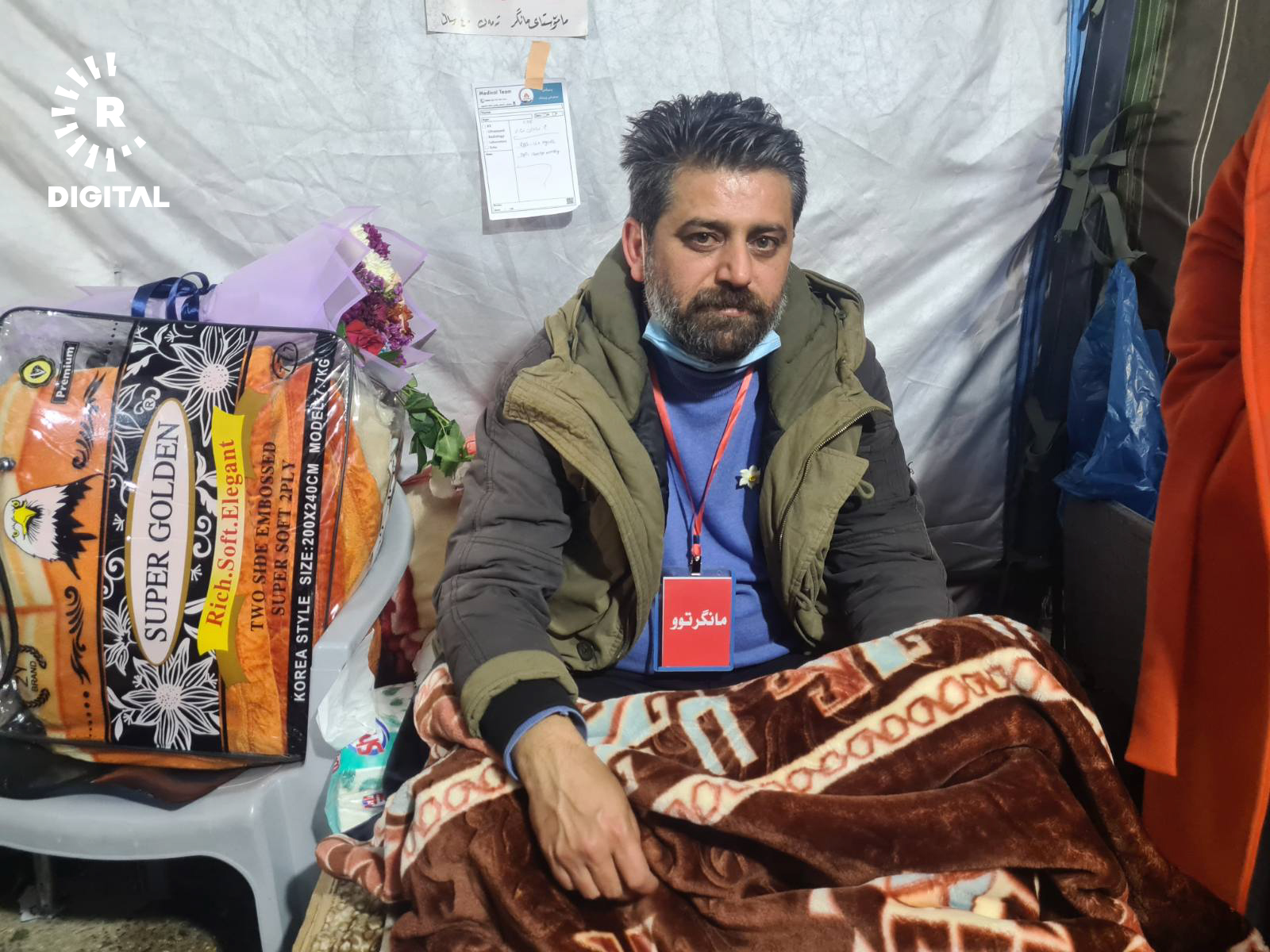
Teachers from various towns and cities in the Kurdistan Region have come to the tent to show solidarity while a KRG delegation is in Baghdad for talks with Iraqi government officials aimed at resolving the longstanding salary crisis.
Civil servants have yet to receive their December and January salaries.
Every day, the entrance of the tent is packed with visitors showing their respect and support from across the Region. Flowers are attached to the tent as a gesture of respect and support for their struggle.
“We are not eating, we are only allowed to have water, tea, and coffee without sugar,” Azad said.
Huddled in a tent at the foot of Mount Goizha, they endure the howling mountain winds that keep them awake at night. These winds are especially stronger and colder in winter.
“We sleep very late and uncomfortably because of the cold wind at the foot of this mountain,” Azad said with bloodshot eyes. “It is very very cold at night, the tent rattles a lot.”
On Thursday, Pakiza Hamaamain, another protesting teacher, vowed that her struggle will continue until her demands are met or until she dies.
“I am not leaving. Either my requests will be fulfilled or I will die an honorable death and be buried by the hands of my people,” she said.
The non-payment of salaries has generated broad public discontent, especially with the KRG.
“We demand the Tawtin [localication] of our salaries, to receive the promotions that have been halted illegally for ten years… and to remove [the issue] of salaries from the disputes between the central and regional governments,” Azad said.
Baghdad’s Tawtin initiative, also known as localization, aims to pay the salaries of Iraq and the Region’s civil servants through bank accounts. The move is part of a broader effort to modernize Iraq's financial infrastructure and ensure transparency in the public sector’s payroll system.
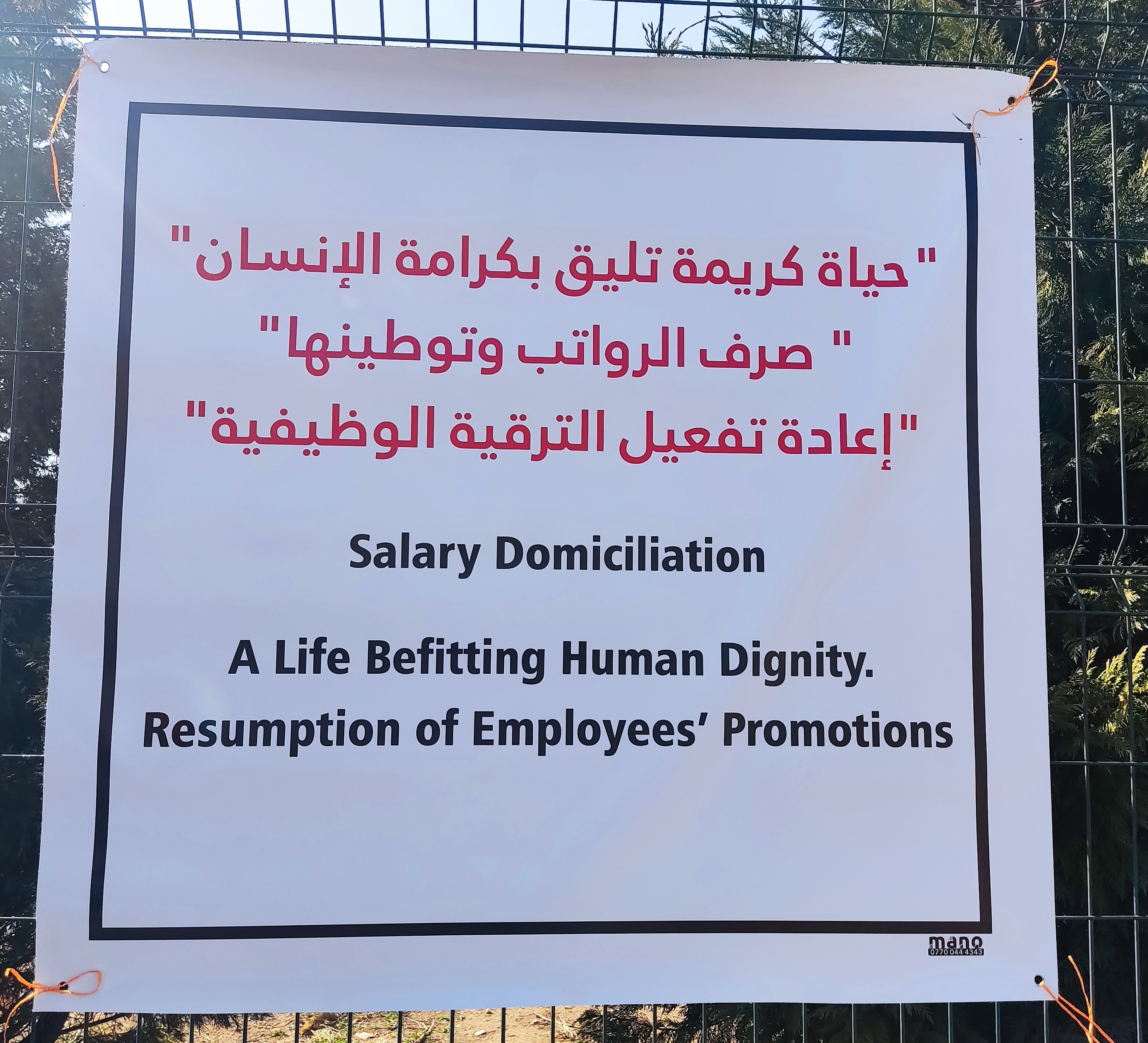
The Region’s alternative, MyAccount, was launched by Kurdistan Region Prime Minister Masrour Barzani in 2023. Some advocate for Tawtin over skepticism regarding the KRG’s ability to pay the funds that Baghdad sends as salaries to the Region’s civil servants.
“We have been boycotting since 2015,” Azad said, emphasizing that they have increased their efforts over the past decade from boycotting to frequent protests, setting up tents in front of government buildings and culminating in this year’s hunger strikes.
In March 2018, crowds took to the streets of Sulaimani protesting salary cuts and corruption. Protests had also spread to Erbil and Duhok in a rare instance. The protesters set up a camp in front of the Sulaimani courthouse. Azad said he was among them.
“We stayed there for ten nights and ten days,” he continued while coughing.
The fatigued teacher said that inconsistent payments of their salaries have caused social and family problems.
“A father who returns home in the evening is unable to [provide] when his children ask them for…” Azad coughed, with his voice straining before continuing. “Whose life has this not affected? Everyone is in a difficult and uncomfortable situation.”
“These are all reasons for us to continue our activism and civil struggle to put pressure on the UN, international organizations, and consulates to put pressure on the regional government to not play with the lives of civilians and public servants in the Kurdistan Region,” he explained.
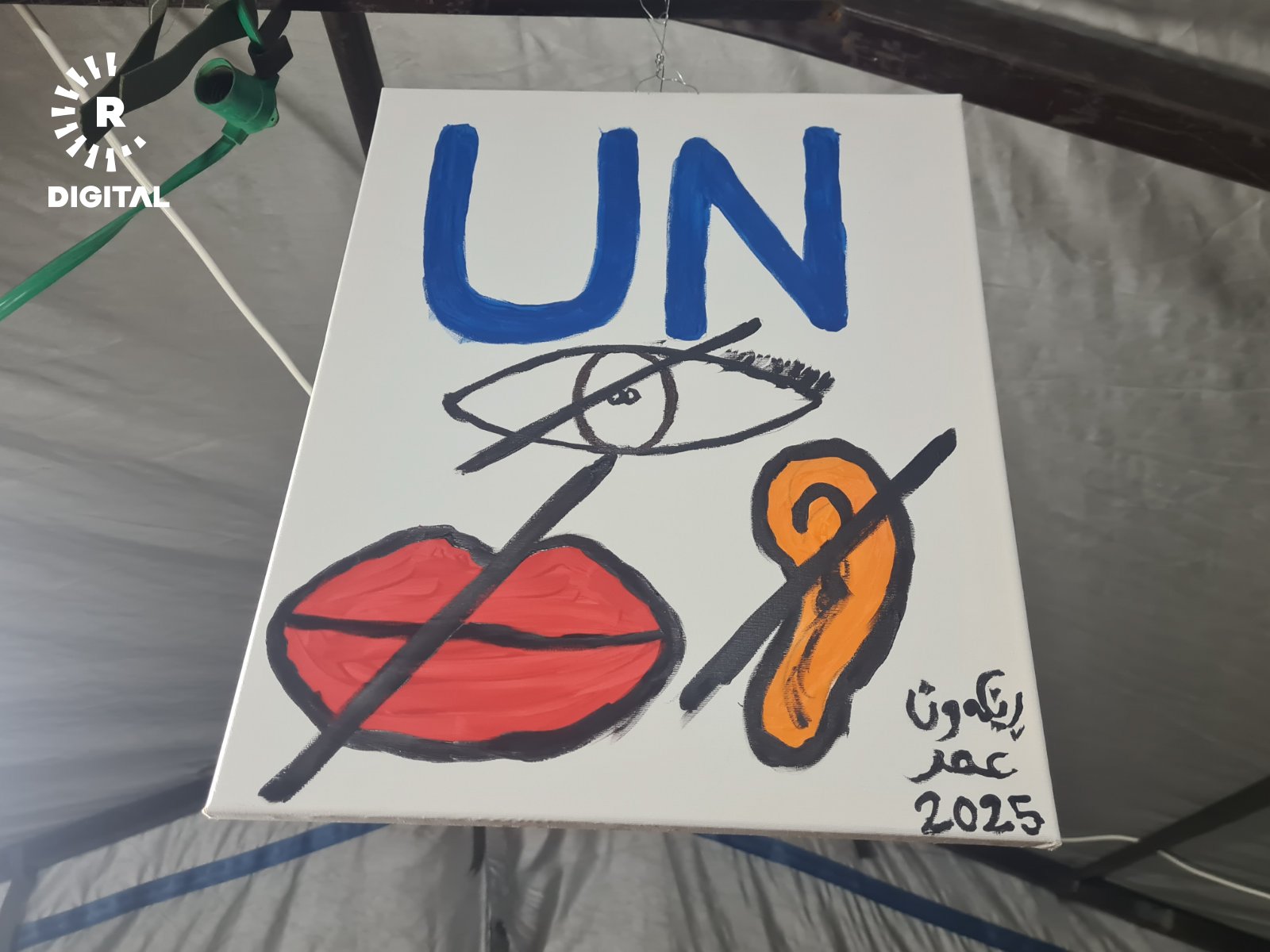
Despite the challenges, Azad remained resolute.
“Our morale is high, we won’t give up our determination, and we will continue until dignity and a strong will return to every individual of the Kurdish nation,” he firmly said. “We hope all sides come together to advance our nation and improve the welfare of our people.”
Later on Sunday, KRG spokesperson Peshawa Hawramani in a press conference accused “some of those [teachers] who are in a tent in Sulaimani now” of “capitalizing on the emotions of poor people and teachers,” saying “they will enrich themselves and find themselves in high positions in this country.”
“We have seen these scenarios before. Some of them will run as candidates for parliament, some will create a list, and some will form a political party,” he alleged.
Dozens of relatives, teachers from other towns and cities, and rights activists visited the tent to show solidarity. Most visitors were content with offering thanks from afar or briefly checking in on their loved ones.
Faraidun Mohammed, a teacher from Sulaimani, was one of the few volunteers standing before the beds, calmly instructing people not to enter the tent yet, explaining that the medical professionals needed more time to finish checking on the protesters.
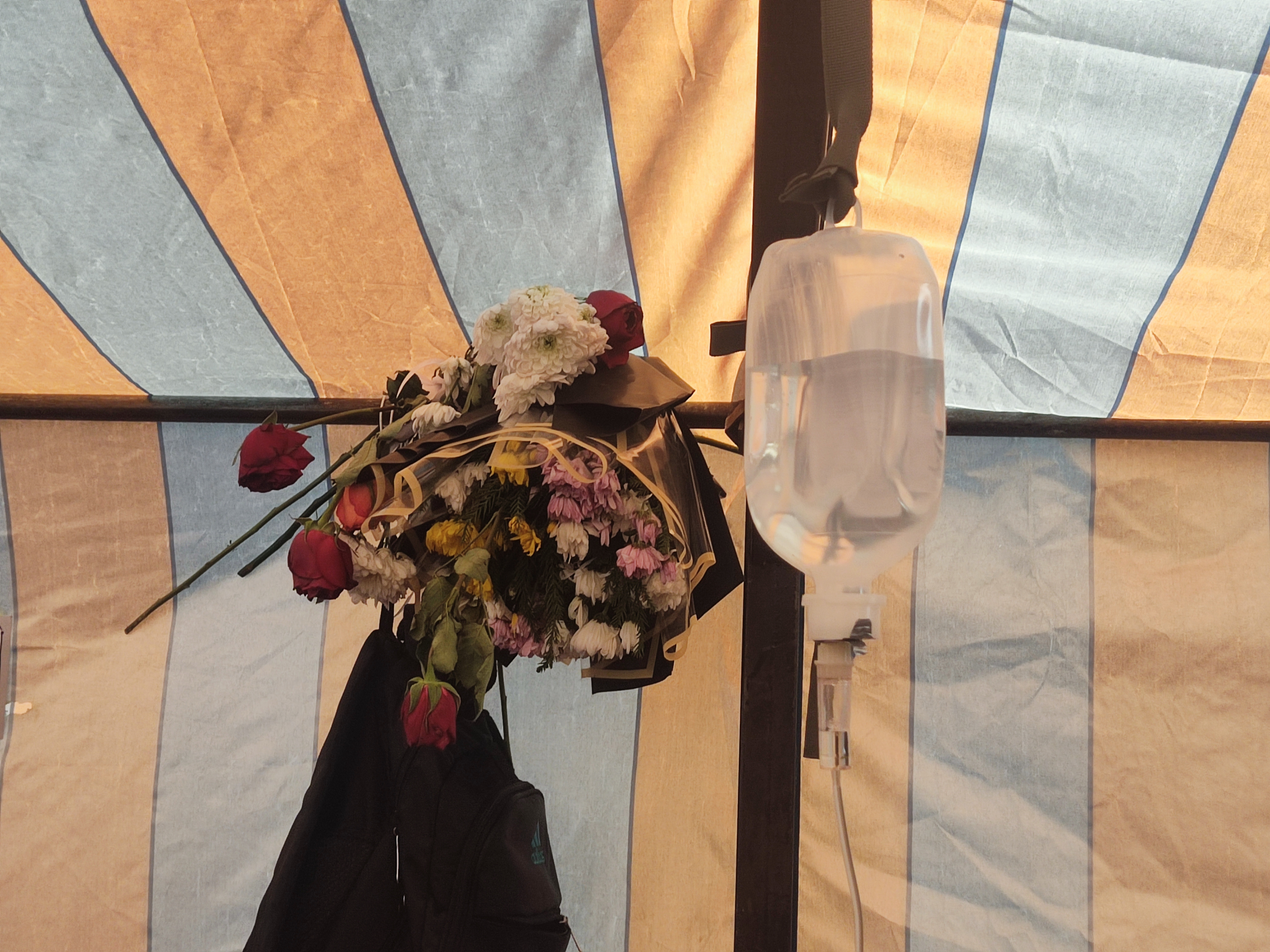
“The condition of three of them worsened, and they were taken to the hospital for treatment today,” Mohammed told Rudaw English, adding with pride that they returned to the tent on the same day.
He noted that some of the protesters have chronic illnesses such as diabetes.
“Of course it is cold! Those large three [gas] heaters were working last night and we were still freezing,” Mohammed said while taking a sip of his tea, after getting a brief moment to sit on the same stackable plastic chair he had spent the previous chilly nights on. Some of the volunteers have been staying at night as well.
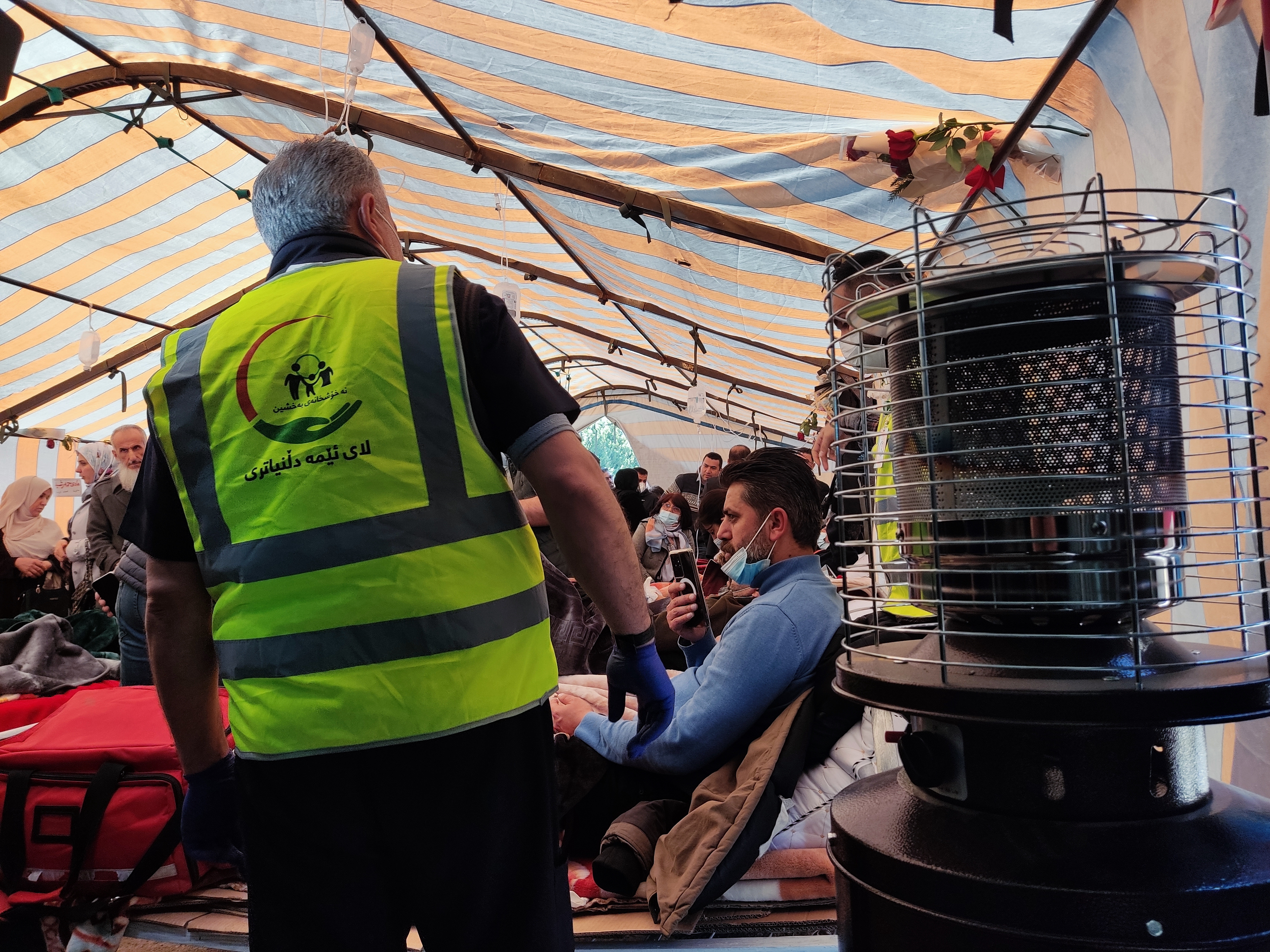
“What is shameful is that no official has visited us who has authority in this country,” Mohammed lamented, wishing to see high-ranking government officials in the tent “to ask about the conditions of the protesters, to give us a promise or a solution to the situation that has made teachers come here.”
Mohammed wished to see high-ranking government officials in the tent “to ask about the conditions of the protesters, to give us a promise or a solution to the situation that has made teachers come here.”
Party leaders from recently founded parties the People's Front (Baray Gal) and the National Stance Movement (Halwest) have visited the protesters. The two parties won a combined 5 seats in the Region’s election in October last year.
During their visits, Halwest leader Ali Hama Saleh and Baray Gal’s Lahur Talabany expressed their support for the protesters while strongly criticizing the two ruling parties, accusing them of corruption.
Meanwhile, the Kurdistan Region's ruling parties, the Kurdistan Democratic Party (KDP) and Patriotic Union of Kurdistan (PUK) have been holding government formation talks, holding 39 and 23 seats respectively.
Erbil and Baghdad have held several meetings to discuss amendments to the previously approved 2025 federal budget law and address obstacles to paying the Kurdistan Region’s civil servant salaries. The KRG has been working to redirect funds from its share of the federal budget to address salary shortfalls that persisted throughout last year.
The KRG’s struggle aggravated after oil exports from the Kurdistan Region through the Iraq-Turkey pipeline were suspended in March 2023. On Sunday, the Iraqi parliament passed a bill that seeks to resume the exports. The resumption of oil exports is expected to boost Iraq’s income, increasing the budget that the Region received from Baghdad.
Later on Sunday, Prime Minister Barzani thanked the KRG’s delegation in Baghdad “for their efforts to put in place a mechanism to resolve the salary issue.
“I hope that this positive step in amending the budget law will be the beginning of resolving all other disputes and the federal government's commitment to provide financial entitlements of the Kurdistan Region,” Barzani said.
But some protesters criticized the delegations.
“These delegations are like a broken record,” Mohammed said in frustration, slamming the KRG’s repeated trips to Baghdad for salary and budget negotiations. “What the officials of this country consider solutions are just band-aid fixes,” he said.“How can you go to Baghdad monthly and ask for salaries and budget [funds]?” he said.
Despite his skepticism and exhaustion, he held on to some hope. “Efforts have been made, and we have hope this situation will pass.”
On Monday, a large crowd of protesters in Sulaimani marched on the Malik Mahmoud ring road towards the tent chanting, “We are the tent of pride, the hope of dissatisfied people.”
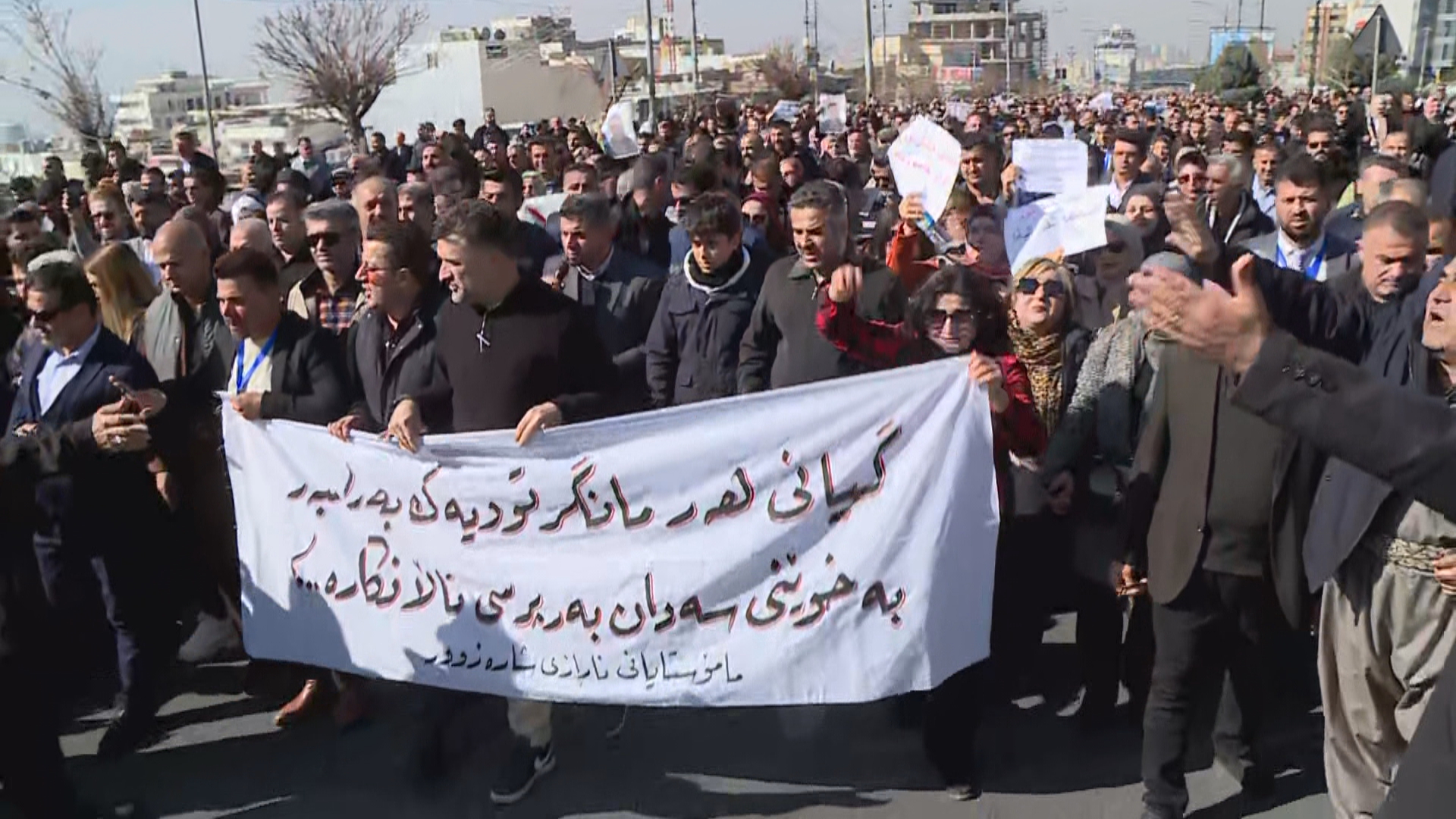








Comments
Rudaw moderates all comments submitted on our website. We welcome comments which are relevant to the article and encourage further discussion about the issues that matter to you. We also welcome constructive criticism about Rudaw.
To be approved for publication, however, your comments must meet our community guidelines.
We will not tolerate the following: profanity, threats, personal attacks, vulgarity, abuse (such as sexism, racism, homophobia or xenophobia), or commercial or personal promotion.
Comments that do not meet our guidelines will be rejected. Comments are not edited – they are either approved or rejected.
Post a comment